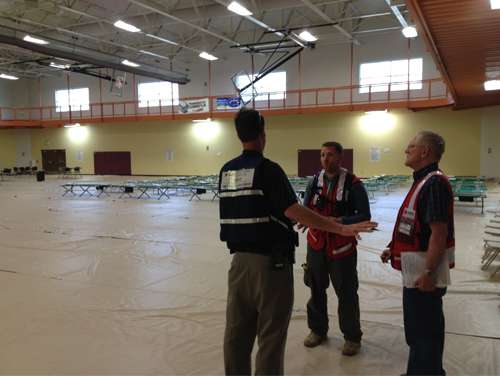Campus responds to community disaster – again
With efforts ranging from personal help to those who lost homes to serving as a community evacuation site, UCCS was a community resource during the June 11 Black Forest Fire.
As the fire reached full containment and more than 30,000 people return to their homes following evacuations, Tim Stoecklein, program director, Office of Emergency Management, and Susan Szpyrka, vice chancellor, Administration and Finance, reviewed actions taken by the university.
For Stoecklein, the contrast between the Waldo Canyon Fire of 2012 and the Black Forest Fire of 2013 was sharp. While the Black Forest Fire replaced Waldo Canyon as the state’s worst fire with 502 homes and 14,000 acres destroyed, its effect on campus was not as direct.
During Waldo Canyon, campus closed because of choking smoke as fire raged on ridges west of campus. The campus also housed more than 400 including United States Air Force Academy cadets, firefighters and members of the Colorado National Guard. UCCS also hosted daily media briefings that brought top government officials together with hundreds of local, regional and international media outlets.
In contrast, the Black Forest Fire did not substantially interrupt campus activities.
The smell of smoke was evident but air quality and visibility were never serious problems. And while the Campus Recreation Center became designated Red Cross shelter, it never housed more than 10 individuals. Another eight families connected with campus stayed in residence halls. Media briefings during the fire were conducted at Pikes Peak Community College’s Rampart Range Campus.
UCCS police officers assisted with traffic control at the Black Forest Fire, an important component to reducing looting in the area or as El Paso County Sheriff Terry Maketa called it “the revictimization” of those evacuated. Both Maketa and Col National Guard Lt. Col. Lt. Col. Mitch Utterback cited the efforts of UCCS Police in daily press briefings.
UCCS was better prepared. As the fire raged, Szpyrka quickly assembled a team of staff members to prepare campus and, specifically, housing, for evacuees. For some, including Ralph Giese, director, Office of Residence Life and Housing, the efforts were déjà vu.
“Seeing our community burn two summers in a row breaks your heart,” Giese said. “I am so proud to be part of UCCS and the greater Colorado Springs community; it is an honor to provide a temporary, safe home away from home for our family members.”
Stoecklein worked closely with Red Cross officials and Campus Recreation Center staff to turn a gym into a shelter. Other staff in the Department of Emergency Management began to compile names of UCCS community members interested in helping. More than 60 volunteered for jobs ranging from sheltering pets to preparing rooms. Regular updates were sent to faculty, staff and students and questions answered via social media.
“By applying lessons learned from last year’s fire, increased cross-training and collaboration with our city, county and state partners, and continued planning and exercise of our campus responses to all hazards, we felt our campus was better prepared to respond in the capacities needed to support the community response during the Black Forest fire,” Stoecklein said.
In another lesson from the Waldo Canyon fire, university officials know that the recovery phase of a disaster can be as challenging as the initial response.
The University Counseling Center and the Trauma Health and Hazards Center compiled a guide to reactions following disaster and offered to assist. To see their recommendations, visit http://communique.uccs.edu/wp-content/uploads/2013/06/UCCS%20HANDOUT.docx
Chancellor Pam Shockley-Zalabak sent an email message to all faculty, staff and students evacuated during the fire and followed it with personal notes to those believed to have suffered substantial property loss. Her personal message offered the university’s full support during the recovery phase.
About seven faculty and staff members are believed to have suffered losses and an estimated 19 students are believed to have had either partial or full losses of their homes. The estimates were obtained by matching published El Paso County
Sheriff Department lists with addresses for faculty, staff and students. Hundreds of UCCS faculty, staff and students spent days evacuated from their homes near the fire.
The Office of Alumni and Friends is interested in learning if any UCCS alumni lost property during the fire. The office will send a UCCS care package. To submit the name of an alum for a care package, contact alumni@uccs.edu
The tone of the chancellor’s support is personal. UCCS faculty and staff who lost homes during Waldo Canyon have offered to provide advice to colleagues in Black Forest who must now go through the scenario of dealing with emotions and details of insurance claims and finances.
“If someone wants to meet for a cup of coffee, I’ll tell them everything I can about recovering,” said Martin Wood, vice chancellor, University Advancement. Wood lost his home during the Waldo Canyon fire and is rebuilding. “It’s hard. But knowing someone else has been through it and is surviving will, I hope, help.”
Related stories
– To see a compilation of messages sent during the Black Forest Fire, visit www.uccs.edu/blackforestfire



